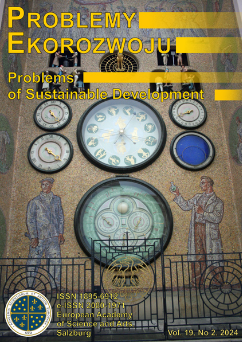Sustainable Development – unbalanced devastation of the environment and its consequences
Wiesław Sztumski
Wyższa Szkoła Lingwistyczna, ul. Nadrzeczna 7, 42-200 Częstochowa (Poland)
Abstract
The article contains a reflection on the role of the idea of sustainable development in supporting the existence of human species. The problem is not easy and raises many questions. The contemporary social context does not favor sustainable development. Firstly, it is too firmly rooted in anthropocentrism, which is supported by the religion, and by the traditional European philosophy. Both make people think more about heaven than about the Earth. Thus, people are focused more on the soul than on the body; they are caring more for the favor of God than for their environment. Secondly, the ideology of consumptionism transforms people into wasters who increasingly over-exploit the Earth’s resources. Thirdly, people – the social masses and the ruling elites – intensely stupefied, are not driven by reason or intellect. That is why, there is little hope that the degradation of environment will be stopped and future generations will be given the chance to survive as a result of the implementation of the idea of sustainable development.
Keywords:
sustainable development, the progress of civilization, consumptionism, religion, philosophy, wasters, environmental degradationReferences
ALLAN F. E., 2012, Study Finds That power can makes you stupid, in: Forbes 6.03.
Google Scholar
DELAVY R., Macht x Dummheit = Selbstzerstörung. Wie viel ‚Mensch‘ braucht der Planet? Kaos Verlag, Wollerau 2005.
Google Scholar
MARCHETTI C., 1979, Ten to twelfth. A Check on Earth Carrying Capacity for Man, in: Energy, vol. 4.
Google Scholar
MARKS K., Ekonomiczeskije rukopisy iz 1857-1858, in: Marks K., Engels F., Soczinienija, vol. 12, Moscow 1958.
Google Scholar
MARKS K., 1968, Iz rukopisov 1861-1863, in: Voprosy istorii jestestvoznanija i techniki 25.
Google Scholar
NOWACKI W., Civilization and Logic. The Law of Inversely Proportional Stupidity, Now Mail Order Books, New York 1983.
Google Scholar
Schwentker B., Lonely Planet?, http://www.demografie-blog.de (26.07.2013).
Google Scholar
SINGER I. B., Meszuge, ATEX, Gdańsk 1995.
Google Scholar
SKIDELSKY R., SKIDELSKY E., Wie viel ist genug? Vom Wachstum zu einer Ökonomie des guten Lebens, Kunstmann Verlag, München 2013.
Google Scholar
Sulima R., Dokument i literatura, Krajowa Agencja Wydawnicza, Warszawa 1980.
Google Scholar
SZTUMSKI W., Ewolucja społeczna ku destrukcji, zniewoleniu i samozagładzie, in: Człowiek i jego pojęcie, ed. Zachariasz A., Wyd. Uniwersytetu Rzeszowskiego, Rzeszów 2011.
Google Scholar
SZTUMSKI W., 2013, Kagańce oświaty, in: Sprawy Nauki, no 2.
Google Scholar
SZTUMSKI W., Menschenähnliche Maschine und maschinenähnlicher Mensch, in: Natur und Subjekt, eds. Breger H., Herbst J., Erdner S., Hannover 2011.
Google Scholar
SZTUMSKI W., Od ‘homo rationalis’ do ‘homo desipio’ i ‘homo sibi destruens’, in: Nauka-Technika-Społeczeństwo. Podejścia i koncepcje metodologiczne, wyzwania innowacyjne i ewaluacyjne, ed. Zacher L., Poltekst, Warszawa 2012.
Google Scholar
SZTUMSKI W., 2013, Od homo rationalis do homo prodigus, in: Sprawy Nauki, nr 1.
Google Scholar
SZTUMSKI W., Rozwój zrównoważony – konieczność, szansa czy mit?, in: Filozoficzne, społeczne i ekonomiczne uwarunkowania zrównoważonego rozwoju, Monografie Komitetu Inżynierii Środowiska PAN, vol. 26, ed. Pawłowski A., KIŚ, Lublin 2004.
Google Scholar
SZTUMSKI W., 2009, The Mythology of Sustainable Development, in: Problemy Ekorozwoju/ Problems of Sustainable Development“, vol. 4, no 2.
Google Scholar
Authors
Wiesław SztumskiWyższa Szkoła Lingwistyczna, ul. Nadrzeczna 7, 42-200 Częstochowa Poland
Statistics
Abstract views: 11PDF downloads: 8
License

This work is licensed under a Creative Commons Attribution-ShareAlike 4.0 International License.




